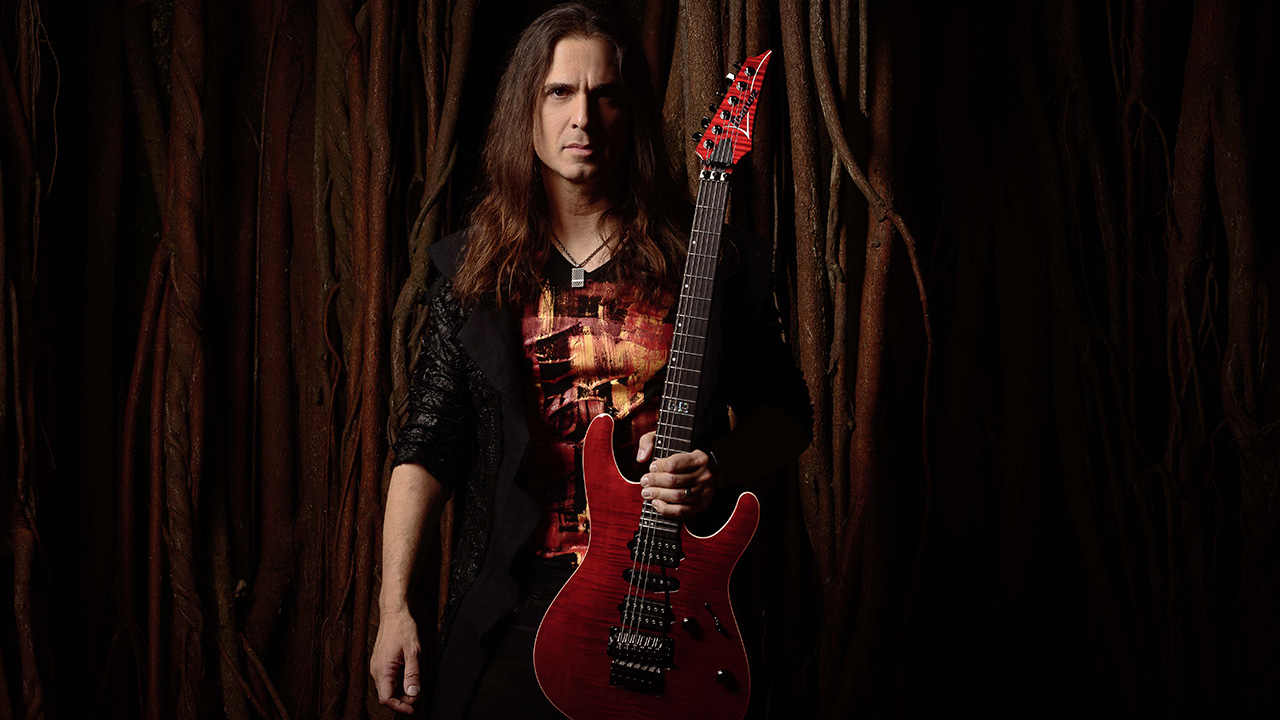“I started writing two-and-a-half years ago. So it’s not a reflection of Kiko leaving Megadeth, but of Kiko thinking about leaving Megadeth”: Kiko Loureiro on making his first new solo material since quitting one of metal’s biggest bands
The Brazilian virtuoso explains how he applied what he learned from Dave Mustaine to his own music, and how he came to terms with selling his guitars

It took Kiko Loureiro a year to make the decision to leave Megadeth in 2023, but the deciding factors were simple enough. “My kids are more important,” he tells Guitar World. “Me being home is more important. Do I need to deny the family thing to feel like a rock star every night?”
After handpicking replacement Teemu Mantysaari, Loureiro laid low for a while. But he’s returned with seventh solo record, Theory of Mind, which demonstrates his genre-bending ways.
“I get great messages from people who see me as a more capable musician,” he reports. “I’m bringing more elements. It’s an intersection of instrumental metal and prog. I don’t know about the guy who only likes Megadeth’s Symphony of Destruction – he might listen say, ‘Oh, it’s too complicated.’”
He doesn’t expect a return to Megadeth-scale stages, but it’s more important for him to feel like he’s being creative.
“Anything related to creativity and the brain is super-interesting – I like to analyze myself and who I am through the music I play. When you create, you make decisions about what’s good. So I wonder, ‘Why do I believe this thing is good?’ It connects with my deeper feelings.”
What’s your state of mind been like since leaving Megadeth leading up to Theory of Mind?
“The album wasn’t composed after I left Megadeth – I started writing maybe two-and-a-half years ago. So it’s not a reflection of Kiko leaving Megadeth, but of Kiko thinking about leaving Megadeth.
Get The Pick Newsletter
All the latest guitar news, interviews, lessons, reviews, deals and more, direct to your inbox!
“It was a long process. It starts slowly in your mind: that feeling with the kids, me being on tour in different time zones, not being there for them. I started to feel bad; you reflect on how many years you’ve been touring. The reflection started a year prior.”
Did you postpone the release intentionally to let the dust settle?
“During my time off before I left Megadeth, I checked the melodies on the demos, and then the decision came. I completed the album in March, but the whole deal was a lot of work. I thought, ‘It’s better to release this when I can dedicate time to social media and record some playthroughs.’ I have to do things in small doses to extend the conversation about the album.”
You’d just come off a massive promotional cycle with Megadeth – releasing an album on your own must be a very different animal.
“It’s not very different; it doesn’t feel different because I’ve done solo albums, so it’s more about aligning your expectations. I’m not expecting to play Madison Square Garden! With Megadeth somebody would book the interviews – now, I’m talking to people directly. Levels of expectations are very important for every artist to understand.”
How would you describe Theory of Mind to someone who only knows you from Megadeth?
“If they discovered me through Megadeth and hear this, they might say, ‘Oh, wow, he’s able to do all this, too!’ If they're a musician, that’s one thing. But if they’re a metalhead, they might not like it because it’s instrumental music. The lyrics in Megadeth are so intense, and people really like the messages – but that was not my intention.”
What was your intention?
“You have the metal circle, the guitarist circle, the shred circle, and the prog circle; I’m inside all these circles. It’s a small niche but my album is for all these people. They have to be fans of metal and guitar, or they won’t like it.
The whole album describes who I am… I like shred, simple groove, and when something has a bit of Brazilian feel
“I told my drummer, ‘This time it’s going to be super-simple.’ My first idea was to have the riffs be very direct – but the album became complicated. My drummer said, ‘This is one of the most difficult albums I’ve recorded!’ I was like, ‘Really? My bad!’”
You purged a lot of gear after leaving Megadeth. What led to that?
“When I came from Brazil to California, I had to learn how to get rid of gear. I was collecting and collecting; and when you move, you say, ‘This is too complicated.’ It’s easier to be more minimalistic.

“I had like 15 guitars with Megadeth. Shipping them overseas when they were about to go on tour would have been hard, so the easiest thing was to sell them on Reverb. It was more about being practical than thinking, ‘I want to open space to buy new, different guitars!’ But I’m not minimal. I have a lot of guitars. If you pass 10 guitars, you're not being minimalistic!”
What guitars did you use on Theory of Mind?
“It’s mainly Ibanez for the leads. I have a Fender Strat for some clean tones and for when I’m trying to do more of a Jeff Beck melody kind of thing. Sometimes I want to have a kind of crystal-clear tone, and I think the Ibanez is better for that. It’s more modern.
“On maybe two or three songs I use my classical guitar, made by a luthier in Brazil. These songs are difficult to play – I have to choose the guitar that feels most comfortable, so my Ibanez signature model is what I usually go for.”
Which song from the album best represents the guitarist you are today?
“I’m not sure! I wanted to more of a fusion thing and I wanted to be a bit more metal. Then, maybe a song with a nice melody. The whole thing describes who I am – it’s like a fractal kind of thing because I like everything. I like shred, I like simple groove, and I like when something has a little bit of a Brazilian feel.”
Has writing songs with Dave Mustaine impacted your approach?
“I tried to take some influence from Megadeth during my songwriting process. I’m trying to write more direct riffs, which I think is the influence. I tend to be more of an improviser. It’s always about how you feel – my visions and the images that come will lead to one thing and then another. If I get stuck, I’ll come back next week to see if you have new visions.
“With Megadeth, of course, you think about the riff and that’s it. You don’t try to develop a second idea from that riff. You record the riff and that’s it. Dave has those riffs and he connects them. Once you believe all the riffs are amazing, it doesn't matter how you connect them because everything is great. All the thrash metal bands from that period follow that rule, I guess.”
I was always saying, ‘Let’s keep playing’… That wastes time when the Megadeth way is like a factory
“I was always jamming, saying, ‘Let’s keep playing and see what’s gonna happen.’ That wastes time when the Megadeth way is like a factory. You create great products and make an amazing bundle. I tried to be a little bit more like that. The Megadeth influence is in the way I create songs, but I still have fun discovering things.”
Theory of Mind represents a significant transition in your life. Where do you go from here?
“One thing is for sure: I like playing, creating songs, and recording. It’s very hard for me to play an AC/DC kind of song, but that’s something I want to do in the future. I want to write a very simple and direct song. I think Megadeth does that.
“It’s an interesting process, and never-ending until I retire or die. When you start as a musician you might think, ‘My album has to be amazing.’ Now I feel this album is part of a journey; I’m thinking about what’s going to be next.”
- Theory of Mind is out now.
Andrew Daly is an iced-coffee-addicted, oddball Telecaster-playing, alfredo pasta-loving journalist from Long Island, NY, who, in addition to being a contributing writer for Guitar World, scribes for Bass Player, Guitar Player, Guitarist, and MusicRadar. Andrew has interviewed favorites like Ace Frehley, Johnny Marr, Vito Bratta, Bruce Kulick, Joe Perry, Brad Whitford, Tom Morello, Rich Robinson, and Paul Stanley, while his all-time favorite (rhythm player), Keith Richards, continues to elude him.
![Kiko Loureiro - Mind Rise [audio] - YouTube](https://img.youtube.com/vi/aSiQTPPE1Gc/maxresdefault.jpg)
![Kiko Loureiro - Out of Nothing [audio] - New Song! - YouTube](https://img.youtube.com/vi/cKr0pGTD6A0/maxresdefault.jpg)



![[from left] George Harrison with his Gretsch Country Gentleman, Norman Harris of Norman's Rare Guitars holds a gold-top Les Paul, John Fogerty with his legendary 1969 Rickenbacker](https://cdn.mos.cms.futurecdn.net/TuH3nuhn9etqjdn5sy4ntW.jpg)







